Heartbreak is kind of my bread and butter. Maybe I shouldn’t speak that sort of thing over myself, but it is what it is. Recently, I invited over a friend who was dealing with some dashed romantic hopes, and it not being my first (or second… or fifth) rodeo, we sat down to chat about it, share some cookies, and watch a movie.
It was the kind of situation where a traditional rom com wouldn’t cut it – we needed something that wouldn’t leave the viewer in the dust when the decked-out “Just Married” car drives away at the end of the story. It turned out my friend hadn’t seen the late-2000’s classic 500 Days of Summer, and I, being someone who could always use a dose of Joseph Gordon-Levitt, put it on.
I absolutely love bittersweet romantic stories. Maybe it’s my history with walking through that sort of disappointment, but something about a love story that doesn’t end well – not because of tragedy but because the main couple makes choices or simply are in ways that lead them apart – feels so much more real and validating than a happy ending. It’s one of the reasons why I love La La Land and Fleabag.
500 Days of Summer is one such story, depicting the 500 days that it takes Tom, a hopeless romantic with puppy dog eyes who works at a greeting card company (it doesn’t get more romcom than that) to fall in and out of love with Summer, played by Zoe Deschanel. Summer embodies the manic pixie dream girl trope that was all over the place in the early 2010s: an ultra-feminine yet easygoing romantic lead whose zest for life and doe-eyed ingenuity inspires men to go to great lengths to have her. She’s so adventurous, she’ll make you want to live a little! She’s so quirky, she’ll wake you up to the joys of dancing in the rain and liking pizza as a personality trait! She’s enigmatic, she’s a mystery, she’s the dream girl that everyone wants and no one can have!
From the start, the movie lays out all the ways that it would be easy to idealise, and even objectify, Summer. Everywhere she goes, people notice her beauty. It makes her good at sales; it gets her things for free. She is sweet and down to earth. She likes the same “bizarro crap” that Tom does. And Tom falls into the trap of idealising her so easily, lamenting to his friends that she’s the one and only person who could ever make him happy.
There’s only one problem with that line of thinking, though: Summer is a human being.
A shallow reading of 500 Days of Summer might take it as another “nice guys finish last” narrative, another lazy perpetration of the manic pixie dream girl trope, designed to elicit sympathy for Tom: when the movie begins, he’s grieving the end of his relationship with Summer, who broke his heart and ruined his life, et cetera. It would be easy to watch the movie without ever moving past how much of a victim Tom is... and how much of a victim he sees himself as.
But the story is told from Tom’s perspective; that’s what Tom wants, but it’s not the full picture of what the film intends. Looking deeper, the film subverts traditional romcom tropes by critiquing the central relationship on both sides: it depicts the pitfalls of Tom’s idealised view of love and romance as embodied by his obsession with Summer, while also honestly depicting the ways Summer mistreats Tom out of her own hurt. In doing so, it urges the viewer to see the humanity in Summer that Tom would rather avoid, while also exposing, for better or for worse, how Tom’s overly rosy perspective of what romance is falls short of the truth of loving and being loved.
And what hurts me most about this movie is that neither of them are right, but also? They both kind of are.
It seems clear to me from the start that Tom and Summer are wrong for each other. “At no point was I convinced that they were actually falling in love,” my friend told me after we finished the movie.
Perhaps that’s because they weren’t. They want totally different things. We learn early on that Summer’s parents divorced when she was a kid. In a bar not long after they first meet, Summer tells Tom that she doesn’t want a boyfriend, or to be “anyone’s anything”, and that she in fact that thinks love is a fairytale and a total fantasy.
It seems completely foolhardy that Tom would think he can never be happy unless this girl who doesn’t want to be someone’s girlfriend becomes his girlfriend. Yet that is exactly what he thinks. He becomes obsessed with Summer, so sure that he’ll be able to slot her into the woman-shaped hole in his life (which, the movie explains, was put there by “early exposure to sad British pop music and a total misreading of the movie The Graduate”). But Summer can’t ever live up to the romance Tom dreams of in part because she has no idea what real love is.
Summer’s baffling actions throughout the movie illuminate this confusion and pain in her. She kisses Tom at the copy machine the day after telling him she doesn’t want to date. They walk through IKEA and play house before she tells him she doesn’t want anything serious. She lets Tom into her inner world and tells him all her secrets, but refuses to put a label on their relationship. And Tom goes along with all of it because he believes Summer is his one, true, destined love and that eventually she’ll realise how much they’re meant to be.
Of course, inevitably, Summer realises that they aren’t. But I would contend that she isn’t meant to be read as an aloof ice queen who strung Tom along: her actions, however head-scratching, highlight her moments of tender humanity, revealing her to be, like Tom, no more than a young person trying to figure out what love really is. Tom’s memories of their relationship make it seem like Summer sprang their breakup on him. But when he looks back on it all after his little sister accuses him of “only remembering the good stuff”, he sees the ways that his and Summer’s relationship was making her unhappy, and revisits their last date in a sad montage of Summer realising that she no longer wants, in fact never wanted, whatever it is that she and Tom have.
Summer was honest with Tom from the beginning. But Tom, wrapped up in his fantasy, chose not to read the signs. Both of them impose on the relationship their messed-up ideas, as we all do, of what romance is supposed to be and do for them. They both do their best with their highest hopes and deepest hurts. In the end, it’s not what either of them could have done or didn’t do: they’re just wrong for each other.
By the end of the film, Summer and Tom’s perspectives on love flip into each other’s opposites. Summer smashes up Tom’s heart so badly that he comes to think that everything he once believed was all a lie. Meanwhile, Summer, once uncertain that love is even real, ends the movie married to a man she ran into at a deli after breaking up with Tom. Now she believes in destiny. “It just happened,” she tells him. “I just woke up one day, and I knew.” Tom replies, “I don’t think I’ll ever understand that. It doesn’t make sense.”
There is some kind of weird, magical alchemy about being in love that I, too, don’t understand. Tom’s right: it doesn’t make sense. How does one person look at another and decide, that one? How does the person being looked at look back at them and think the same thing? Why does it happen to some, and not to others: to one person but not always to both? Aside from their completely mismatched views on romance, why weren’t Tom and Summer right for each other?
I’ve heard it said that someone can be the right person at the wrong time - that someone might have been meant for you if they’d met you at another point in their life or yours. I’m prone to disbelief in such a notion. In my mind, timing is everything. If the timing is wrong, the person is wrong. Maybe I believe that because it slams the door on what if.
This might be what makes 500 Days of Summer so compelling to me: the way it captures how deeply one can feel something that isn’t meant to be, and the way that other things — better things — inevitably are. Why does it have to be this way, and why does it hurt so much to stumble our way to what’s right?
Even so, despite how crushing their breakup is, there is something fateful about Tom and Summer’s relationship exactly the way it is, in all its pain. They need each other, though not in the way Tom first hoped for: it takes Summer breaking his heart for Tom to actually start living the life he’s always wanted. Once their relationship ends, he quits his job and pursues his dream of becoming an architect (and, in the last scene of the movie, meets someone new). It takes Summer being with Tom to realise what it was that she was truly looking for in a partner: that elusive, unnamable something that, she tells him heartbreakingly, “I was never sure about with you”.
There’s lots about 500 Days of Summer that didn’t age well, but it’s hardly a revenge story: it’s a sympathetic look at how painfully and wonderfully wrong we can be about the things we feel most certain about. It demands grace for the hurt inflicted on both ends of the central relationship, and it has a happy ending of a different sort, landing on the optimistic promise that even after the worst heartbreak of your life, or even after everything you thought was true turns out to be wrong, you might just stumble across joy again. You might just rebuild your life. You might just find that you have what it takes to go after what you’ve always wanted.
And even if Tom is kinda the worst, this writer will always carry a torch for Joseph Gordon-Levitt.
Recent Faves:
📺: Like everyone else in the entire world, I was captured by the Paris Olympics and especially appreciated the aesthetic of this Games: cobblestones, pastels, monuments, good vibes.
🎵: I’ve been enjoying the latest Vitamin String Quartet album.
📖: I’m listening to the audiobook of George Saunders’ Tenth of December and have picked up A Gentleman in Moscow on a friend’s suggestion, which is such a delight!
🧶: I recently made my own Traveler’s Notebook following a similar tutorial to this one with some elastic and scrap leather given to me by a friend. Including the notebooks I filled it with, it cost me around £15 to make something that would have cost >£60 brand new. It now comes with me everywhere!



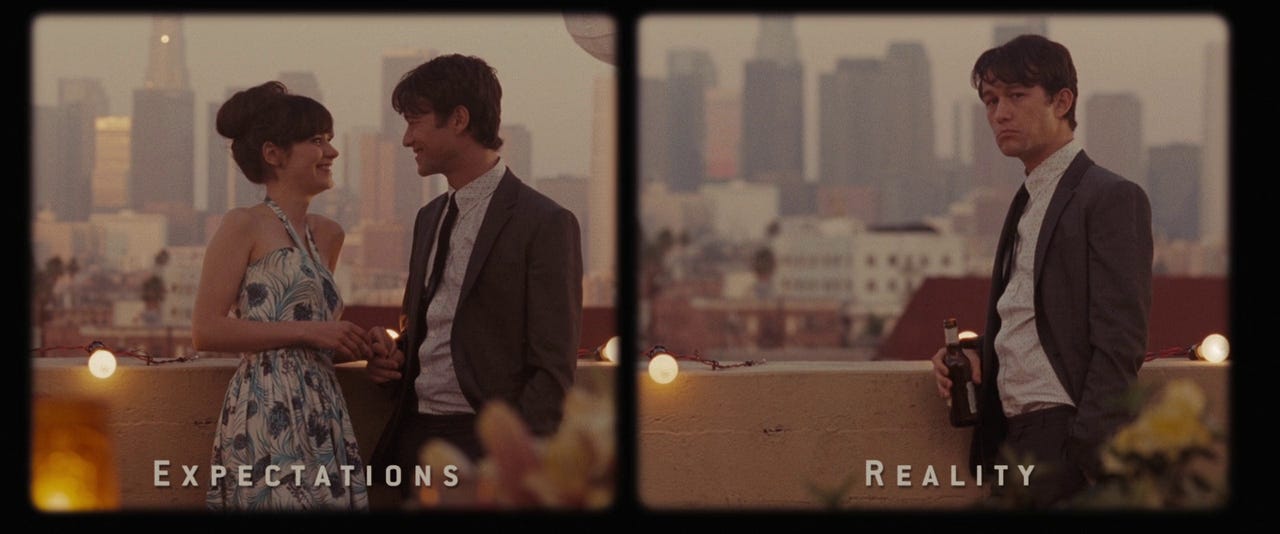

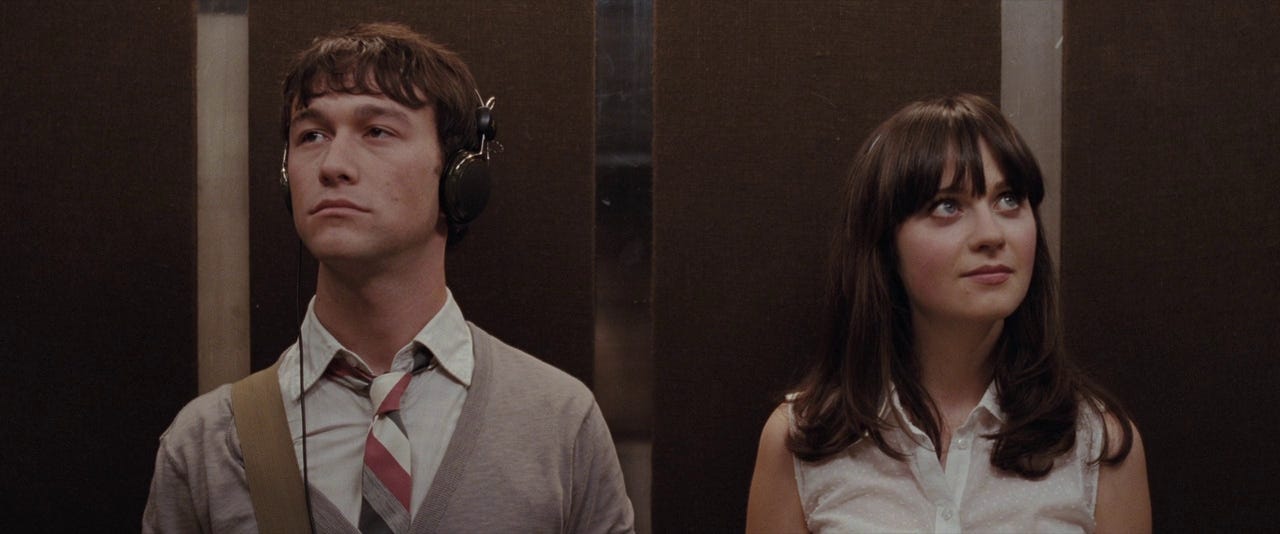
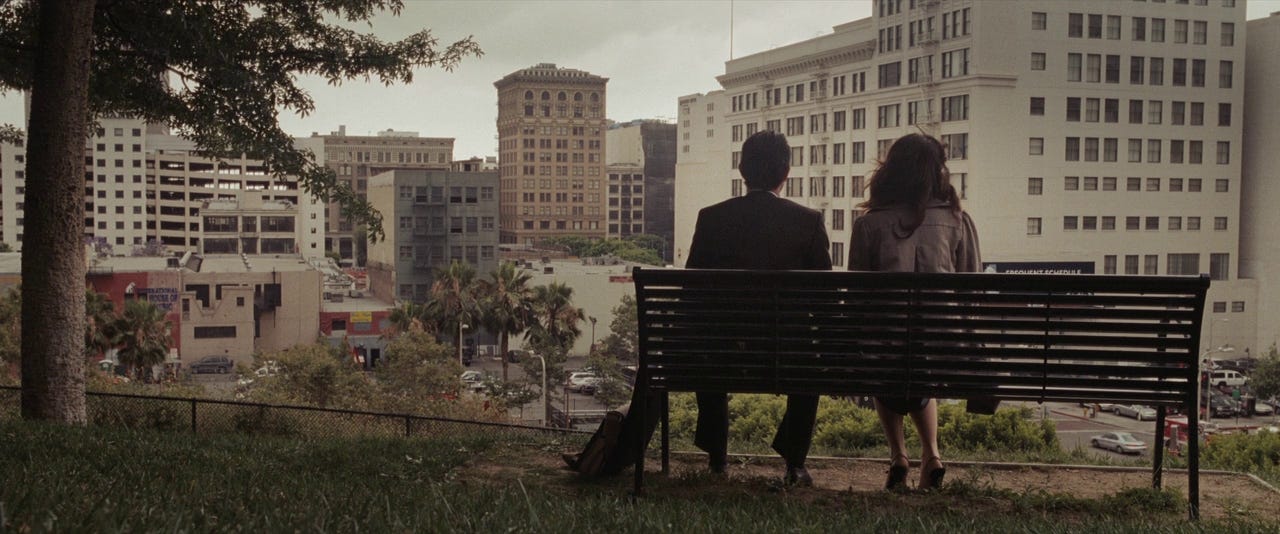
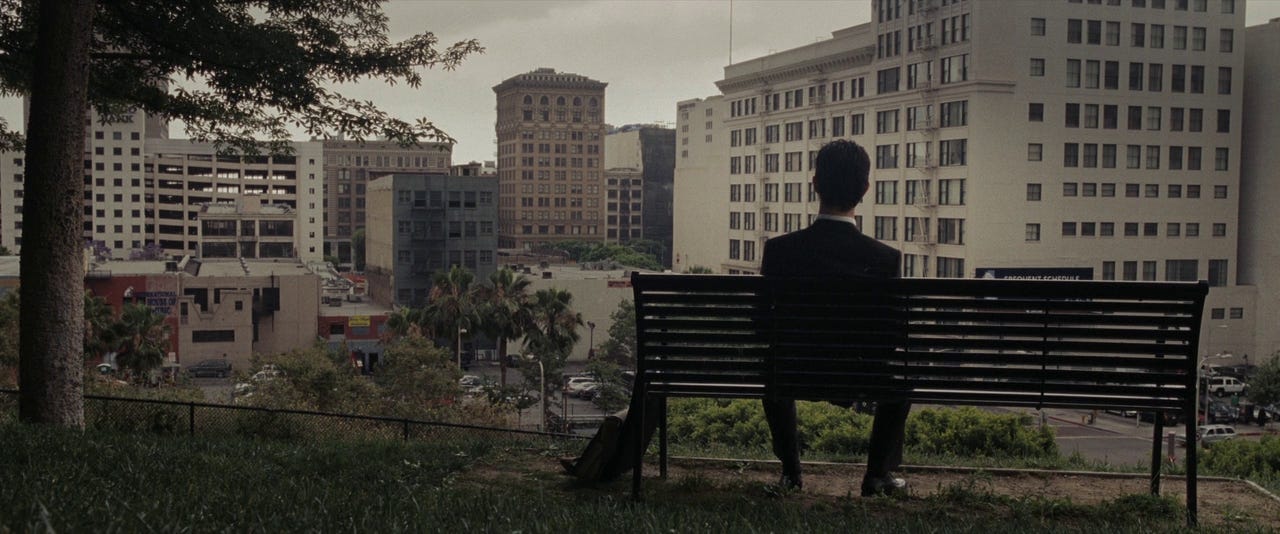
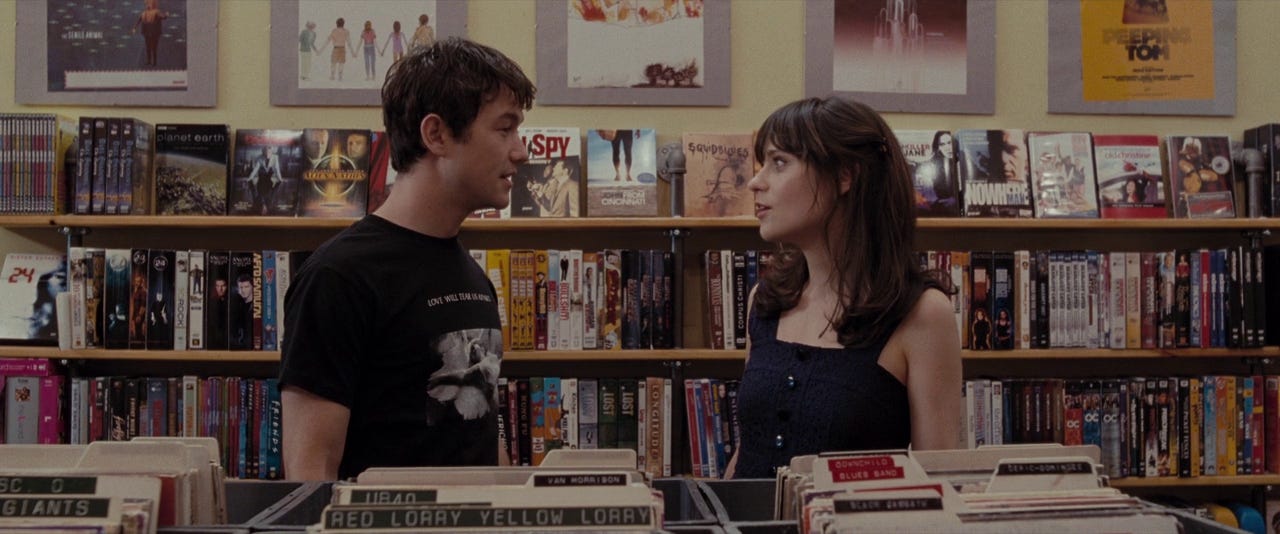
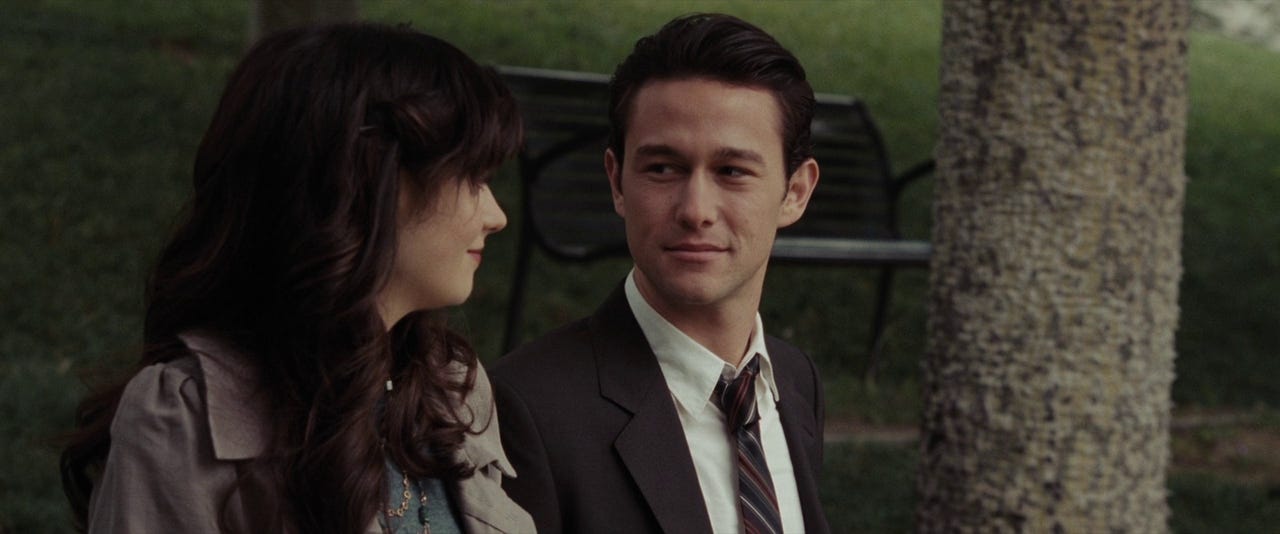

V drawn by this because my most tragic romantic time was when someone I liked told me it was the 'wrong time'. PSA to women, never do that lol. Waiting on a right time is killer. I think I came by this movie after. To be fair to both, it's very powerful stuff. JPII talks about how when we have the experience of 'falling in love' we experience an individual kind of exploding in value in our lives, they come to mean everything out of nowhere. It's a lot. So, I empathise with JGL and my younger friends when I hear them talk about this for the first time. But I'm glad it becomes more tempered each time. Anyway I'm gonna wrap this long comment here. Substack is great.
Timing equals to me stages in life.
In my early thirties I was way more insecure and looking for other things in my partner. I was tiring and a pain in the ass.
At the stage that I'm now I'm looking for a loving partner but not with all these requests, you may say my search is a lot more unconditional.